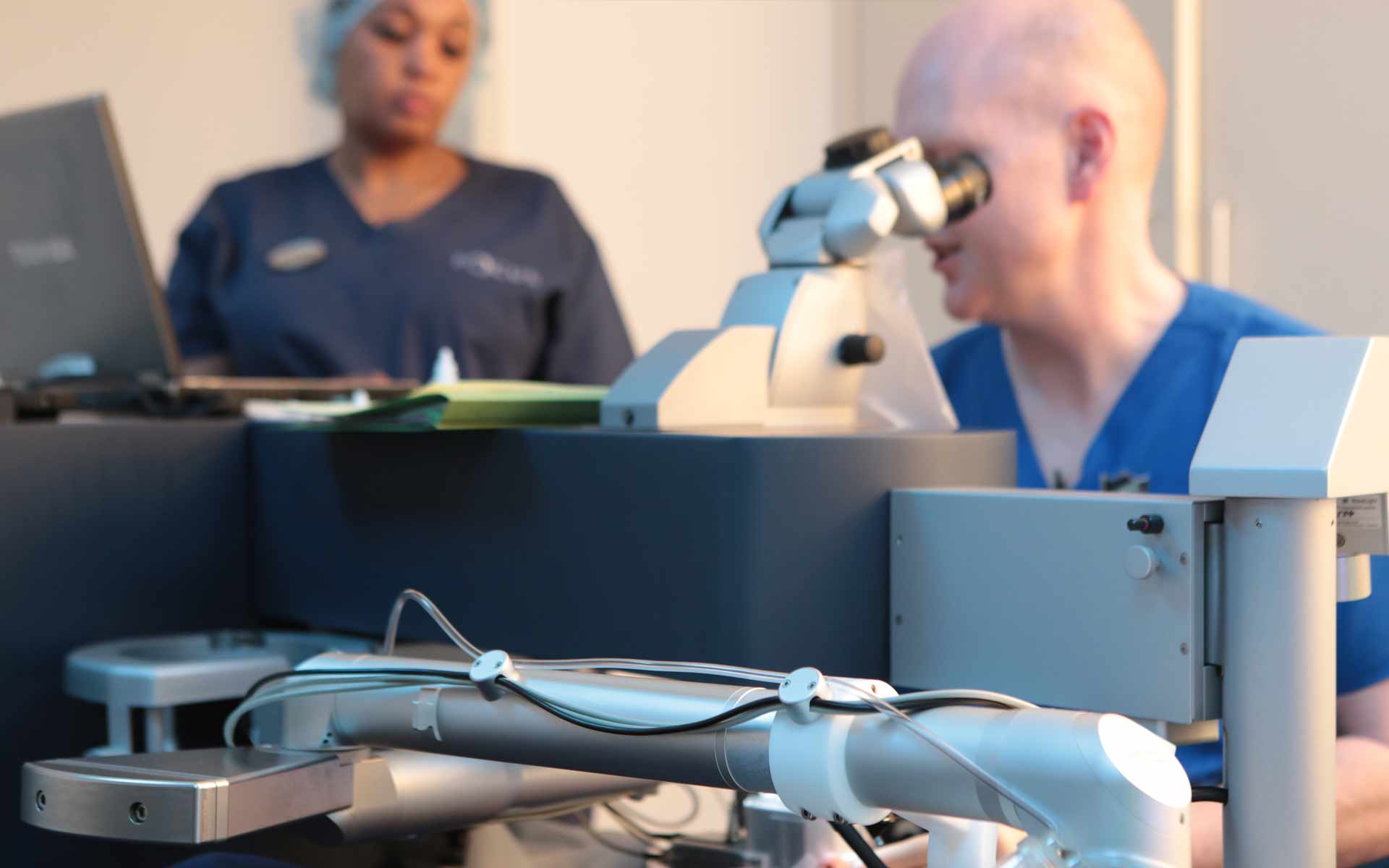The Pros and Cons of Laser Eye Surgery

Understanding Laser Eye Surgery
Laser eye surgery, also known as refractive surgery, is a procedure designed to correct common vision problems. This surgery utilizes highly focused laser beams to reshape the cornea, the clear front part of the eye, allowing light to enter properly and land on the retina for improved vision. With the rise of technology, many individuals are considering this option to liberate themselves from glasses and contact lenses.
The procedure has evolved significantly since its inception, with advancements in laser technology leading to safer and more effective outcomes. Today, various techniques, including LASIK, PRK, and LASEK, are available, each catering to specific eye conditions and patient needs. These innovations have made laser eye surgery a popular choice, with millions of successful procedures performed worldwide each year, providing patients with the freedom to engage in activities without the hindrance of corrective eyewear.
What is Laser Eye Surgery?
Laser eye surgery encompasses a range of procedures aimed at correcting refractive errors—nearsightedness (myopia), farsightedness (hyperopia), and astigmatism. The most well-known type, LASIK (Laser-Assisted In Situ Keratomileusis), involves creating a thin flap in the cornea and reshaping the underlying tissue with a laser. This technique is favored for its quick recovery time and minimal discomfort, allowing patients to return to their daily routines within a day or two.
Other procedures, like PRK (Photorefractive Keratectomy), do not involve creating a flap; instead, the outer layer of the cornea is removed, and the laser directly reshapes the cornea’s surface. Each method has its unique characteristics but ultimately aims to achieve clearer vision. For instance, PRK may be recommended for patients with thinner corneas or those who are more active in contact sports, as it eliminates the risk of flap-related complications. Understanding the nuances of each procedure is essential for patients to make informed decisions about their eye care.

The Science Behind the Procedure
The fundamental science behind laser eye surgery lies in its ability to reshape the cornea. The cornea plays a crucial role in focusing light onto the retina, and a properly shaped cornea ensures optimal vision. During surgery, lasers—such as excimer lasers—modify the curvature of the cornea by removing precise amounts of tissue. This precision is vital, as even minor alterations can significantly impact visual acuity.
The laser-based technology is guided by advanced diagnostic tools that map the eye’s surface. This high level of precision minimizes potential errors and enhances the overall effectiveness of the surgery. Additionally, the use of wavefront technology allows for a personalized treatment approach, addressing not only basic refractive errors but also higher-order aberrations that can affect vision quality. As a result, patients can experience not just improved vision but also enhanced clarity and contrast, making laser eye surgery a transformative option for many seeking visual freedom.
Learn about catract surgery on: How Much Does Cataracts Surgery Cost in Australia
The Benefits of Laser Eye Surgery
One of the primary incentives for undergoing laser eye surgery is the transformative benefits it offers to individuals who are tired of relying on corrective lenses. With a successful procedure, many people experience substantial improvements in their vision, allowing them to fully engage in daily activities without visual aids. This newfound freedom can lead to a more active lifestyle, enabling individuals to participate in sports, travel, and other activities that may have been challenging with glasses or contacts.
Improved Vision Quality
Many patients report an immediate improvement in their vision following the procedure. By correcting refractive errors, laser eye surgery can enhance visual acuity, making everyday tasks, such as reading and driving, significantly easier and more enjoyable. The clarity of vision can be life-changing, as individuals often describe the world around them as more vibrant and detailed, allowing them to appreciate the beauty in their surroundings.
Furthermore, the quality of vision can improve in various lighting conditions. Patients often find their night vision and peripheral vision significantly enhanced, making the transition to life without glasses or contacts much more comfortable. This improvement can be particularly beneficial for those who drive at night or engage in outdoor activities, as they can navigate their environment with greater confidence and safety. Find more about comfortable on https://www.nysid.edu/academics/what-is-interior-design
Long-Term Cost Efficiency
While the initial expenditure for laser eye surgery might seem steep, many find it to be cost-effective in the long run. Continuous expenses for glasses, contacts, and their maintenance can accumulate significantly over time. By opting for laser eye surgery, many patients end up saving money over the years. This financial aspect can be a compelling factor for many, as they weigh the costs of ongoing vision correction against a one-time investment in their eyesight.
Additionally, the longevity of the results can offer a considerable financial advantage. Many individuals achieve durable vision correction with just one procedure, reducing the need for ongoing corrective measures. This not only saves money but also eliminates the hassle of regularly purchasing new lenses or glasses, providing a sense of relief and convenience that many patients cherish.
Rapid Recovery Time
One notable advantage of laser eye surgery is its rapid recovery period. Many patients can return to their normal activities within a day or two post-surgery. Although some mild discomfort or visual fluctuations may occur initially, the majority report substantial improvements within a short timeframe. This swift recovery allows individuals to quickly adapt to their new vision, often leading to an immediate boost in their overall quality of life.
This quick turnaround makes the procedure particularly appealing for those with busy lifestyles, as they can resume their daily tasks without prolonged downtime. Many patients express gratitude for being able to return to work or engage in family activities shortly after their surgery, reinforcing the idea that laser eye surgery is not just a medical procedure, but a gateway to a more fulfilling and unrestricted life.
The Risks and Drawbacks of Laser Eye Surgery
While laser eye surgery comes with numerous benefits, it is essential to consider the potential risks and drawbacks. Every medical procedure carries intrinsic risks, and laser eye surgery is no exception. A comprehensive understanding of these risks is vital for anyone considering the surgery.

Potential Side Effects
Common side effects of laser eye surgery may include dry eyes, glare, halos around lights, and fluctuating vision. Many of these effects are temporary but can be bothersome for some patients. In particular, dry eyes can be a persistent issue, as laser surgery can alter the corneal nerves responsible for tear production.
Patients are advised to communicate any side effects experienced after the surgery with their healthcare provider, as solutions and treatments are often available to mitigate these concerns. For instance, artificial tears or prescription eye drops can help alleviate dryness, while specialized contact lenses may be recommended to protect the cornea during the healing process. Understanding that these side effects can vary in intensity and duration is crucial, as some individuals may experience a more pronounced impact than others, particularly during the initial recovery phase. To learn nore about dryness click here.
The Possibility of Complications
Like any surgical procedure, laser eye surgery carries the risk of complications. Although serious complications are rare, they can occur. Issues such as infection, excessive corneal thinning, or undercorrection/overcorrection of vision may arise.
It is crucial for individuals to have an open dialogue with their surgeon regarding the potential risks and to undergo a thorough pre-operative evaluation to assess suitability for the procedure. Surgeons often utilize advanced diagnostic tools to measure the eye’s shape and thickness, which can help minimize the risk of complications. Additionally, patients should be aware that certain lifestyle factors, such as smoking or not following post-operative care instructions, can increase the likelihood of complications, making adherence to medical advice even more critical.
Limitations of the Procedure
Laser eye surgery is not suitable for everyone. Certain conditions, such as severe dry eye syndrome, advanced cataracts, or corneal scarring, may disqualify candidates from the surgery. Additionally, individuals with unstable vision or certain health issues, like autoimmune disorders, may also be advised against undergoing the procedure.
Moreover, while many patients achieve exceptional results, not everyone will end up with perfect vision, and additional procedures may be necessary for some individuals. It’s important to set realistic expectations and understand that factors such as age, the degree of refractive error, and overall eye health can influence the outcome. Patients should also consider that the effects of aging on vision may still require them to use glasses or contact lenses in the future, even after successful laser eye surgery. Engaging in a thorough discussion with an eye care professional can help clarify these points and provide a clearer picture of what to expect post-surgery.
Making an Informed Decision
Deciding whether to undergo laser eye surgery is a significant choice that necessitates thorough consideration and understanding. Potential candidates should weigh the benefits against the risks and evaluate their individual circumstances before arriving at a decision.
Factors to Consider Before Surgery
Several factors should influence the decision-making process, including age, lifestyle, and the severity of personal vision issues. Younger individuals whose prescriptions may still be changing are generally advised to wait until their vision stabilizes before considering surgery.
The lifestyle of the individual also plays a role; those with high-demand visual requirements or rigorous activities may find laser eye surgery particularly beneficial, while others may prefer to explore alternative options.
Preparing for Laser Eye Surgery
Before surgery, prospective patients should attend a series of consultations to assess their eye health and suitability for the procedure. Tests may include measuring the shape and thickness of the cornea, as well as evaluating overall eye health.
Patients should also prepare by avoiding contact lenses in the weeks leading up to the surgery, as lenses can alter the natural shape of the cornea, affecting the surgical outcome.
Post-Surgery Care and Maintenance
After undergoing laser eye surgery, patients must follow carefully outlined post-operative care instructions. This typically includes using prescribed eye drops to promote healing and prevent infection, as well as avoiding strenuous activities that may put stress on the eyes.
Regular follow-up appointments are crucial to monitor healing progress and address any concerns promptly. Engaging with the healthcare provider for guidance on lifestyle modifications post-surgery can further enhance the overall outcomes of the procedure.